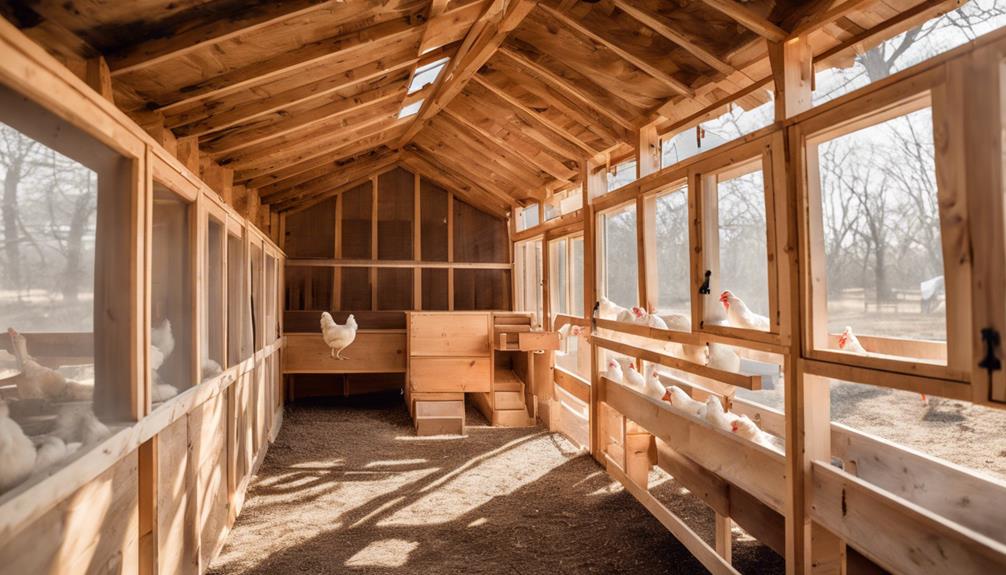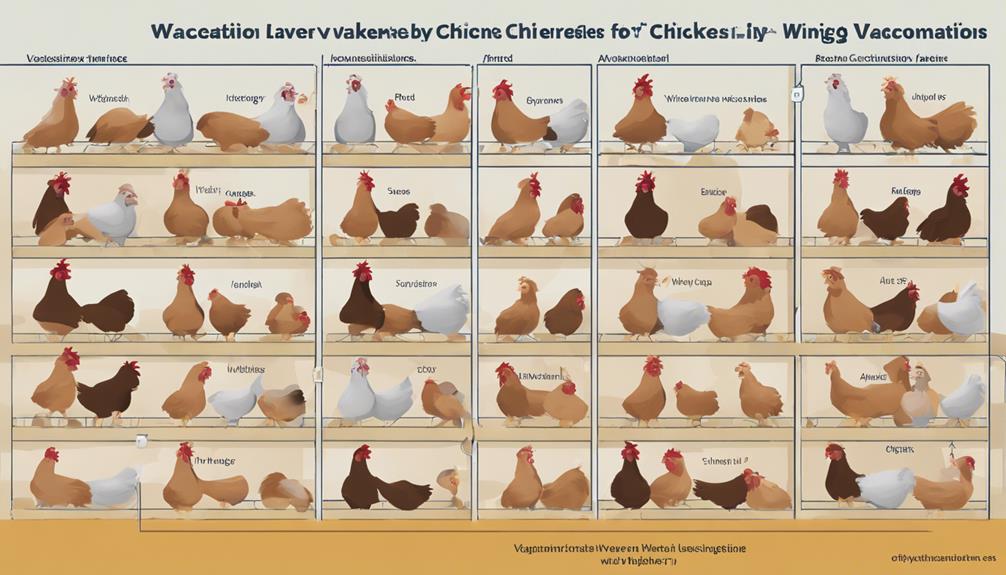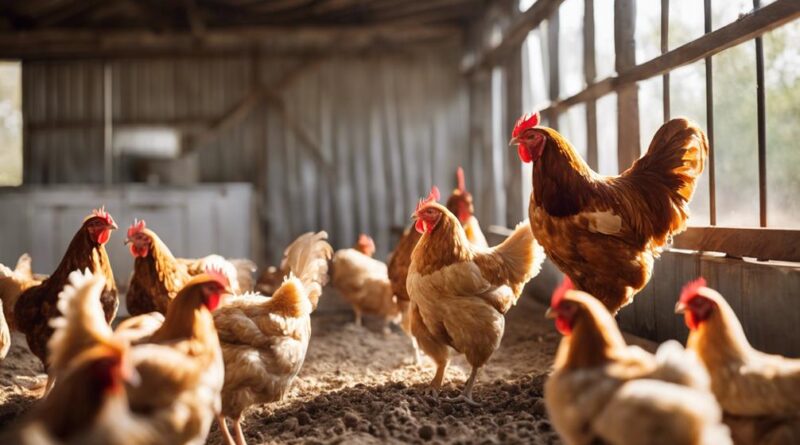Top 10 Strategies for Enhancing Layer Chicken Health"
To enhance layer chicken health, prioritize balanced nutrition tailored to meet their specific needs. Ensure clean water supply, optimal ventilation, and regular health checks to monitor well-being. Manage stress through environmental enrichment and maintain comfortable housing conditions. Implement parasite control measures, adhere to vaccination programs, and promote social interaction for behavioral enrichment. These strategies work synergistically to boost overall chicken health and productivity.
Balanced Nutrition
To optimize layer chicken health, ensure a balanced nutrition plan that meets their specific dietary requirements for optimal performance and well-being. Layer chickens require a diet rich in essential nutrients to support egg production and overall health. Incorporating nutritional supplements into their feed can be beneficial, especially during peak laying periods or when facing stressors. Calcium, phosphorus, vitamins, and minerals are crucial for eggshell quality and overall bird health. Consulting with a poultry nutritionist to formulate a balanced diet can ensure that the chickens receive the necessary nutrients.
Feeding schedules play a critical role in maintaining optimal health for layer chickens. Providing consistent access to feed and water is essential. Layer chickens have specific feeding patterns, so it's crucial to establish a routine that aligns with their natural behavior. Overfeeding or underfeeding can lead to health issues and decreased egg production. Monitoring feed consumption and adjusting quantities based on production levels and environmental conditions is key to managing a successful flock.
Nutritional supplements such as probiotics or vitamin additives can also be introduced to support gut health and immune function. These supplements can aid in digestion, nutrient absorption, and overall well-being. However, it's essential to follow recommended guidelines and consult with a veterinarian or poultry nutrition expert before adding any supplements to the chickens' diet. By implementing a well-rounded nutrition plan and adhering to proper feeding schedules, you can enhance the health and productivity of your layer chickens.
Clean Water Supply
Ensuring a consistent and uncontaminated water supply is paramount for maintaining the health and productivity of layer chickens. Water quality plays a crucial role in meeting the hydration needs of your flock. Here are some key considerations to optimize the cleanliness and quality of the water supply:
- Regular Cleaning: Clean waterers at least once a week to prevent the buildup of algae, bacteria, and other contaminants that can harm your chickens.
- Proper Sanitization: Use a mild bleach solution or other recommended disinfectants to sanitize waterers and pipes to eliminate harmful pathogens.
- Water Testing: Periodically test the water source for contaminants such as heavy metals, pesticides, or microbial impurities that could affect chicken health.
- Temperature Control: Ensure water is neither too hot nor too cold, as extreme temperatures can discourage chickens from drinking enough, leading to dehydration.
Maintaining a clean water supply is vital for supporting the overall health and well-being of your layer chickens. Clean water not only keeps your flock hydrated but also helps in improving feed consumption, digestion, and egg production. By paying attention to water quality and ensuring proper hydration, you can enhance the health and performance of your layer chickens.
Proper Ventilation
Maintaining proper ventilation within the chicken coop is essential for ensuring optimal air quality and respiratory health for your layer chickens. Proper ventilation involves managing air circulation and temperature control within the coop to create a comfortable and healthy environment for your birds.
Effective air circulation is crucial in a layer chicken coop to prevent the buildup of harmful gases such as ammonia and carbon dioxide. Stagnant air can lead to respiratory issues and increased stress levels in chickens. To promote good air circulation, consider installing vents or windows that can be opened to allow fresh air in and stale air out. Additionally, using fans can help improve airflow within the coop, especially during hot and humid weather conditions.
Temperature control is another critical aspect of proper ventilation in a chicken coop. Layers are sensitive to temperature extremes, so it's vital to maintain a consistent and comfortable temperature range. Ventilation plays a key role in regulating the temperature inside the coop by preventing overheating in the summer and maintaining warmth during colder months. By ensuring proper ventilation, you can create a conducive environment that promotes healthy respiratory function and overall well-being for your layer chickens.
Regular Health Checks
Regularly conducting health checks on your layer chickens is crucial for monitoring their well-being and promptly addressing any potential health issues. Preventative care plays a vital role in maintaining the overall health of your flock, and early detection of any health concerns can significantly impact the well-being of your chickens.
Here are some key points to consider when performing regular health checks:
- Physical Examination: Conduct routine physical examinations to check for any abnormalities in your chickens' appearance, such as injuries, parasites, or signs of illness.
- Weight Monitoring: Keep track of your chickens' weight to ensure they're maintaining a healthy and consistent weight, as sudden weight loss can be indicative of underlying health issues.
- Behavior Observation: Monitor your chickens' behavior daily to identify any changes in their activity levels, eating habits, or social interactions, as these can be early indicators of potential health problems.
- Egg Quality Inspection: Regularly examine the quality of the eggs your hens are laying, looking out for abnormalities in size, shape, or shell texture, as these can reflect the health status of your chickens.
Stress Management
To effectively manage stress in your layer chickens, implementing structured environmental enrichment practices can greatly benefit their overall well-being and productivity. Stress in chickens can lead to a variety of health problems and decreased egg production. Providing environmental enrichment such as perches, dust baths, and toys can help reduce stress levels by promoting natural behaviors and preventing boredom.
Relaxation techniques are essential for maintaining good mental health in layer chickens. Calm environments with appropriate lighting and ventilation can create a stress-free atmosphere. Additionally, incorporating soothing sounds or music in the chicken coop has been shown to have a positive impact on mental well-being.
Stress reduction can also be achieved through the implementation of coping mechanisms. For instance, ensuring a consistent daily routine for feeding, watering, and egg collection can help chickens feel secure and reduce anxiety. It's important to handle chickens gently and calmly to avoid causing unnecessary stress.
Biosecurity Measures
Implementing stringent biosecurity measures is crucial for safeguarding the health and well-being of your layer chickens. Disease prevention is paramount in maintaining a healthy flock. Here are four essential biosecurity measures to consider:
- Quarantine Protocols: All new birds should undergo a quarantine period upon arrival at your farm. This helps prevent the introduction of diseases into your existing flock. Quarantine should ideally last for at least 30 days, during which new birds are kept separate from the main flock.
- Visitor Restrictions: Limiting farm visitors is crucial to reduce the risk of disease transmission. Visitors, including service providers and veterinarians, should follow strict biosecurity protocols such as changing into farm-specific clothing and footwear and sanitizing their hands before entering the poultry area.
- Sanitation Practices: Regular cleaning and disinfection of equipment, housing, and common areas are vital to prevent the spread of pathogens. Use appropriate disinfectants recommended for poultry facilities and ensure thorough cleaning routines are in place.
- Biosecurity Education: Educate all farm personnel about the importance of biosecurity measures. Training should cover topics such as recognizing signs of diseases, proper handwashing techniques, and the significance of following biosecurity protocols diligently.
Comfortable Housing

Ensuring optimal comfort in the housing environment for your layer chickens is essential for promoting their overall health and productivity. Cozy nestboxes play a crucial role in providing a comfortable and secure space for your chickens to lay eggs. The nestboxes should be designed to be quiet, dark, and secluded to mimic the natural nesting habits of chickens. It's recommended to have one nestbox for every 4-5 hens to prevent overcrowding and ensure that each hen has access to a suitable nesting area.
Safe perches are another important aspect of comfortable housing for layer chickens. Perches should be smooth, rounded, and wide enough for the chickens to comfortably roost without causing foot injuries. The perches should be placed at a height of about 2-4 feet above the ground to allow the chickens to rest and sleep off the ground, which helps prevent them from coming into contact with feces. Additionally, perches should be positioned in a way that allows all chickens to access them easily, without overcrowding or competition.
Parasite Control
For effective control of parasites in layer chickens, maintaining a rigorous and consistent monitoring schedule is imperative to safeguard the health of your flock. Parasites can significantly impact egg production and the overall well-being of your chickens. Here are some strategies for effective parasite control:
- Regular Monitoring: Conduct routine checks for signs of parasites such as mites, lice, and worms. Early detection is key to preventing widespread infestations.
- Proper Sanitation: Ensure clean living conditions by regularly cleaning coops, nesting boxes, and surrounding areas. Parasites thrive in dirty environments.
- Natural Remedies: Consider using natural remedies like diatomaceous earth or essential oils known for their parasite-repelling properties. These can be effective alternatives to chemical treatments.
- Preventive Measures: Implement preventive measures such as quarantine protocols for new birds, as introducing infected chickens can lead to parasite outbreaks. Additionally, rotating grazing areas can help reduce parasite loads in the soil.
Vaccination Programs

To safeguard the health and productivity of your layer chickens, establish a comprehensive vaccination program tailored to their specific needs and the prevalent diseases in your region. Disease prevention is crucial in maintaining a healthy flock. Vaccines work by stimulating the chicken's immune system to produce antibodies against specific pathogens. Understanding the vaccine efficacy is essential to ensure proper protection. Different vaccines have varying levels of effectiveness, so selecting the right ones based on your region's prevalent diseases is key.
Adherence to a strict vaccination schedule is imperative for optimal immune response. Vaccines need to be administered at the correct age and in the right dosage to ensure maximum protection. Deviating from the recommended schedule can leave your chickens vulnerable to diseases, reducing the overall effectiveness of the vaccination program. Work closely with a veterinarian to develop a customized vaccination plan that meets the specific needs of your flock.
Regularly assess the success of the vaccination program by monitoring disease incidence and overall health. Adjust the program as needed based on these evaluations. Remember, a well-executed vaccination program is a cornerstone of maintaining the health and welfare of your layer chickens.
Behavioral Enrichment
Developing a structured program for behavioral enrichment is vital in promoting the mental and physical well-being of your layer chickens. Implementing strategies that focus on activity stimulation, social interaction, environmental enrichment, and behavioral diversity can significantly enhance the overall health and welfare of your flock.
- Activity Stimulation: Introducing objects like hanging treats, pecking objects, or perches within the chicken coop encourages physical activity and mental engagement. Chickens are naturally curious creatures and providing them with stimulating activities can prevent boredom and reduce aggressive behaviors within the flock.
- Social Interaction: Chickens are social animals that thrive in the company of their flockmates. Encouraging social interactions through group feeding, dust bathing areas, and spacious living quarters promotes natural behaviors and reduces stress levels among the chickens.
- Environmental Enrichment: Enhancing the chicken coop with features like perches, nesting boxes, and varied terrain provides opportunities for exploration and mental stimulation. An enriched environment allows chickens to exhibit their natural behaviors, leading to improved welfare and overall health.
- Behavioral Diversity: Offering a variety of enrichment activities such as hanging vegetables, foraging boxes, or mirrors promotes behavioral diversity among the chickens. This diversity not only keeps the chickens mentally engaged but also helps prevent repetitive behaviors that can indicate stress or boredom.
Frequently Asked Questions
How Can I Prevent Cannibalism Among Layer Chickens?
To prevent cannibalism among layer chickens, focus on behavioral training and prevention methods. Implement socialization techniques and provide environmental enrichment to reduce stress and aggression within the flock.
Monitoring the chickens closely for any signs of aggressive behavior can help intervene early. By creating a positive and enriching environment for the chickens, you can significantly decrease the risk of cannibalistic behaviors.
What Should I Do if a Chicken Shows Signs of Aggression?
If a chicken displays signs of aggression, intervene promptly. Implement behavioral training to address this issue.
Utilize aggression management techniques to modify their behavior. Understand flock dynamics and employ socialization techniques to enhance their interactions.
Monitoring and addressing aggression early can prevent further issues. Remember, proactive interventions can positively impact the overall health and well-being of your layer chickens.
Can I Use Essential Oils to Promote Chicken Health?
Yes, you can use essential oils to promote chicken health. Benefits include natural insect repellent properties and stress reduction. Drawbacks may include skin irritation if not properly diluted.
When applying, mix essential oils with carrier oils like coconut or olive oil and avoid direct contact with eyes or mucous membranes. Diffusing oils in the coop or adding to drinking water are effective application techniques.
Always consult with a veterinarian before using essential oils on your chickens.
How Do I Handle a Chicken That Is Broody?
When dealing with a broody chicken, it's important to manage this behavior to ensure egg production isn't affected. To address broodiness, you can gently remove the hen from the nesting area several times a day and encourage her to engage in other activities.
Placing her in a well-lit, well-ventilated area can help stimulate egg production. By actively managing broodiness, you can maintain a healthy egg-laying routine for your chicken.
What Are Some Natural Remedies for Common Chicken Ailments?
When looking to treat common chicken ailments naturally, consider incorporating herbal supplements like garlic and oregano for immune boosting properties.
Homeopathic remedies such as arnica and calendula can also aid in healing various issues.
Natural treatments like apple cider vinegar in the water can help combat parasites.
These alternatives can promote overall health and well-being for your flock.
Conclusion
In conclusion, implementing these top 10 strategies for enhancing layer chicken health is crucial for maintaining a productive and thriving flock.
By ensuring balanced nutrition, clean water supply, proper ventilation, regular health checks, stress management, comfortable housing, parasite control, vaccination programs, and behavioral enrichment, you can promote optimal health and well-being in your layer chickens.
Remember, a healthy flock is a happy and productive one.
